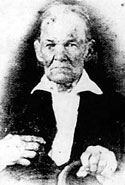Patrick Gass
 |
Patrick Gass was the main carpenter on the Lewis and Clark expedition. He
also is credited with popularizing the name Corps of Discovery. Image courtesy of Meryl Wieder. |
An old saying claims that anyone can tear a building down, but it takes a carpenter to build it. In Patrick Gass the Corps of Discovery had its carpenter.
Gass' carpentry skills were invaluable throughout the expedition. He oversaw and led the construction of all three of the Corps' winter quarters: Camp Dubois, Fort Mandan, and Fort Clatsop. His records of those forts, chronicled in the journals he kept, were particularly detailed.
Gass would have missed the expedition were it not for Meriwether Lewis' pulling rank. Gass was stationed in 1803 under Capt. Russell Bissell in Kaskaskia in the Illinois Territory. Secretary of War Henry Dearborn had instructed Bissell to furnish Lewis with one sergeant and eight good men. Gass volunteered, but Bissell denied him, not wanting to lose his best noncommissioned officer. Lewis used the authority given by Dearborn to enlist Gass anyway.
Born in 1771 in Pennsylvania of Irish descent, the gray-eyed, dark-haired Gass found himself in a leadership role rather quickly on the expedition. When Sgt. Charles Floyd died of a burst appendix on Aug. 20, 1804, the captains ordered a vote of the men for a new sergeant. Gass received the most votes, 19. On Aug. 26 Lewis appointed him sergeant. The short, barrel-chested Gass was known for conversation "better suited for the camp than the parlor."
Gass didn't limit his carpentry skills to the forts the expedition opened. He also was skilled at making canoes. He made dugout canoes from trees around Fort Mandan, White Bear Island at the Great Falls, and Canoe Camp in Idaho. At the Great Portage he created wagons to carry the canoes the 17 miles around the falls. Gass and two others also assembled "The Experiment," Lewis' iron frame boat that he had carried from Harpers Ferry, VA. Though the boat failed to last a day at the falls, the captain showed his faith in Gass by choosing him to put it together.
Perhaps Gass' greatest legacy came after the expedition. The captains had asked all the sergeants to keep a journal. Gass did so dutifully, though he said he "never learned to read, write, and cipher till he had come of age." No matter. Unlike Lewis, Gass quickly went to work publishing his journals upon his return. His journal the next year, the first published from the expedition, was a paraphrased version of his original field notes. Of the journals published from the members of the Corps of Discovery, Gass' is considered the easiest to read. Some of that is owed to Gass' editor, but the rest to his journalistic style of simply reporting the facts. For instance, his entry from April 30, 1805:
| "We embarked at sunrise; had a fine morning and went on very well. We passed through a handsome Country, with a rich soil, and the prairies rising beautifully on both sides of the river. We went 24 miles and encamped on the North side. Captain Lewis killed a large elk here." |
And speaking of the Corps of Discovery, Gass gets credit for popularizing the name. It was featured boldly on the title page of his 1807 published journal.
Gass later went on to fight in the War of 1812 under Gen. Andrew Jackson. He was discharged after losing an eye in an accident. He also was the longest living member of the Corps. He married at the age of 60, had a number of children, and settled in Wellsburg, WV, where he died in 1870.
Clark paid tribute to his savvy sergeant in a letter to President Jefferson about the men of the Corps. About Gass he wrote of the sergeant's "ample support . . . manly firmness . . . the fortitude with which he bore the fatigues and painful sufferings." Lewis said Gass had Lewis' "highest confidence" and that the sergeant was entitled to "the consideration and respect of his fellow citizens."
< previous | next > | 


